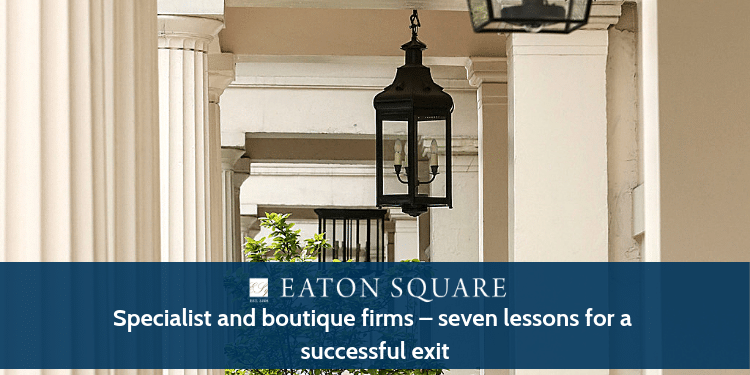
I penned a similar post about three years ago and got some great feedback then. Since then the M&A market has continued to change and I thought I’d add some further reflections and observations to that original post.
Growth strategies for specialist and boutique firms can be fraught with contradictions and conflicts. The potential for growth and scale is a fundamental component of a firm’s exit valuation, but how to grow at the right pace whilst retaining a compelling and attractive value proposition to potential acquirers?
In seeking growth, too many firms enter new product markets prematurely and destroy the core component of their value to an acquirer. Others seeking to expand geographically spread themselves too thin and start to burn equity. So, what is the answer?
Here are seven lessons from advisory and transaction mandates we have undertaken for our specialist and boutique clients:
Resist the temptation to become a generalist.
This might sound obvious, but specialist firms often try and take their existing clients on a ‘generalist’ journey. “We can do that as well”, you may hear yourself say when buoyed by the success of a relationship and apparent proximity of additional revenue. For a boutique firm, ‘generalism’ is the slippery slope to oblivion, why compete with other generalists, it will detract from your attractiveness to an acquirer and undermine your raison d’être.
Deep dive into market segments.
Look to apply your expertise into sub-segments of your target markets. This will give you a granular understanding of the application of your expertise, deeper insights into your client’s issues, how your client’s industry segments operate and where they are placed in those market segments. The upshot is a strengthening of both your expertise and your understanding of your client’s business – both attributes enhance the value of your firm. But this requires investment in time and money.
Develop a strategy to achieve ‘unprompted awareness’ of your expertise in your chosen markets.
Many of us speak at or attend conferences, and many clients can be ‘conference-overdosed’, but for those who don’t understand deeper buying processes what you are striving for is the nirvana of ‘unprompted, or top of mind, awareness’. For a boutique firm that is aiming to be heard above the noise from the ‘usual suspects’, this comes from continuous, consistent and prolonged exposure at the right events, committees, think tanks, joint seminars, press coverage etc. Achieve open recognition for being an expert who has solved an issue – demonstrate insight from experience. As I heard at a planning workshop last week “Be seen, be heard, be read”.
Allocate team responsibility and share the love.
Too many boutique firms operate the way young kids play soccer – they chase the ball like a swarm. Even a small firm can allocate internal responsibility for multiple market segments and allow experts to be developed across a spread of niche markets. Sometimes team members fear they will be allocated a market that will have no future or be downright boring. If that’s the case, then they are not a team but a group of competing individuals. Teams work together, and support and trust each other. If sub-segments are not yielding the right return from the right effort, move on. Boutique firms should be considered teams, as opposed to larger firms that may have that ‘up or out’ competitive culture.
Invest time and money in operational succession.
Can the level of revenue and profit remain at current levels and ideally grow if you, the owner, sell-out or step back? Too often founders of firms struggle to transition their leadership and relationships to those coming through because they have not invested time and money into operational succession. For example, they have not recruited well enough, or their ego remains a barrier (a symptom of this is that they can’t retain good people), or both. If you can’t prove you have achieved operational succession you can’t expect a top multiple and valuation for your business.
Plan strategically not tactically.
Too many boutique or specialist firms confuse being nimble with being strategic. Yes, be tactically nimble so you can compete more effectively against the ‘usual suspects’ but operate within a strategic plan – build and share your own strategy-on-a-page that is focused on the who, what and why.
Build resilience into your culture and leadership.
The highs are exhilarating but the lows can be debilitating. Ensure your team can cope with both, that the highs don’t create false courage (aka believing your own bullshit) and the lows jettison the faint-hearted. Develop an empowered culture that is trusting, nurturing and supportive, through effective communication, transparency and a likeminded set of values and behaviours. More than ever acquirers are performing due diligence on a target’s culture, experienced acquirers seek a cultural fit, without it an investment can be worthless.
Lastly, thanks to Thor Essman for this insightful comment added to my earlier post:
“Be humble. Hubris kills more companies than cash flow”.
Doesn’t it just!
